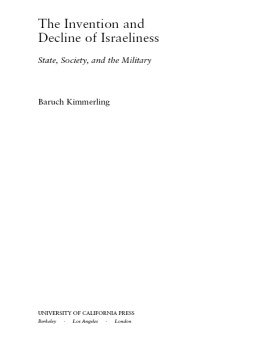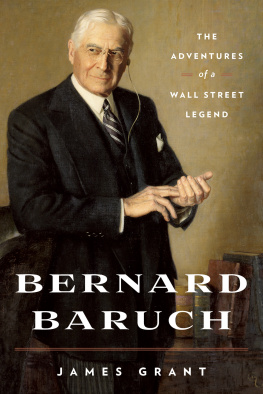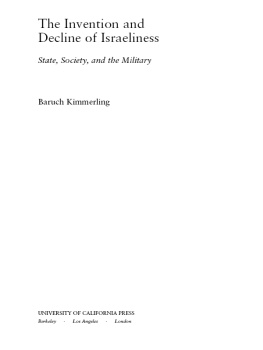First published in 2012 by
Berghahn Books
www.berghahnbooks.com
2012 Baruch Kimmerling
First ebook edition published in 2012
All rights reserved. Except for the quotation of short passages for the purposes of criticism and review, no part of this book may be reproduced in any form or by any means, electronic or mechanical, including photocopying, recording, or any information storage and retrieval system now known or to be invented, without written permission of the publisher.
Library of Congress Cataloging-in-Publication Data
A C.I.P. catalog record for this book is available from the Library of Congress
British Library Cataloguing in Publication Data
A catalogue record for this book is available from the British Library
ISBN 978-0-85745-720-2 (paperback)
ISBN 978-0-85745-751-6 (ebook)
A GUERILLA FIGHTER FOR IDEAS
I did not pave roads and I did not dry up swamps. I was not a pioneer, a warrior, or even a military officer. I did not establish settlements and I did not build industrial plants. I wasnt exactly a Holocaust survivor or a secret agent. I neither founded nor wrecked political parties. I was never even a member of one or a public figure. I wasnt a pop star, a cultural hero, an actor in the theater, or a player in a stadium. I am not a poet, an author, a sculptor, or a painter. I am certainly not a dancer. So, what actually did I do that would justify the writing of an autobiography and, even more so, its reading?
I was, and still am, primarily a producer, critic, disseminator and examiner of ideas as well as someone who has been trying to shelve several ideas which, according to my values, should be abandoned. At the very least, I tried to argue with their advocates and I like to think of myself as a guerilla fighter for ideas. However, an idea must also pass the reality test; that is, it is necessary to examine, using different methods, how people, groups, and organizations act and react in real life and to ask how their actual practice compares to the norms and ideologies according to which they claim to act. What am I, then? I research societies using a comparative approach, a discipline known in public as sociology. But sociology also includes the study of history, culture, and economics as well as the examination of ideas, the investigation of social movements, states and the relationships between them, and all patterns of activities of groups of men and women and their identity.
Sociology may be classified in many ways. For the purpose of this book, I will distinguish between academic and public sociology, a concept that is still not widely known in Israel. The academic sociologist whose credentials are well established is secluded in the academic ivory tower and his goal is to advance human knowledge. Whether his findings will ever be used is not a major concern of his and his main audience is primarily his students and colleagueswhich is not insignificant. Indeed, he may, from time to time, emerge from the tower to talk to a larger public, mostly when he is challenged by other social agents such as the media, or when he is called on by the public relations department of the university that employs him to support some cause. But these are not his main concerns.
The public sociologist (or the intellectual) must be an academic sociologist who is obliged, no less than his academic colleague, to succeed in the area of research and observe the professional ethos. At the same time, in addition to his research, he must also try to influence, with the help of his ideas, the public political, social, economic, and cultural agenda, primarily through the creation and distribution of alternative ideas capable of replacing those that are currently dominant. He also aims to correct what seems to him to be flawed in his own society. The public sociologist sees these activities as part of his duty. The most prominent example, in my opinion, is that of the French sociologist and philosopher Raymond Aron. Aron, after serving in de Gaulles Forces Franaises Libres, returned to France and became a professor of Social Thought and Political Sociology at the Sorbonne (and a few other universities in France). At the same time, over a period of thirty years, he wrote a column for the newspaper Le Figaro. He and Jean-Paul Sartre were of the same vehement opinion about the need to withdraw the French settlers from Algeria. They did, however, differ in their philosophical paradigms and in their ideological approach. Aron opposed Sartres existentialism and was a rationalist and a humanist and, in contrast to Sartre and most of the French intellectuals of that period, did not sympathize with Communism and did not support the Soviet Union. As a result, he was unjustifiably considered a conservative.
It is unnecessary, I believe, for me to state that I see myself as a public sociologist, as will be seen later, primarily in part four of this book.
The creation of an idea is a strange process that I myself do not fully understand, even when it occurs in my own mind. Furthermore, I did not find satisfying explanations for the phenomenon of intellectual creativity. I am not referring here to a single concept, like those written by a copywriter, but rather to the creation of a complex world of content such as a new paradigm. A paradigm contains a system of criteria that permits an examination in the field that either supports or rejects accepted opinions such as, for example, the one claiming that Israel is not a militaristic society. This process includes the precise identification of the types of militarism that do and do not exist in Israel through a quite innovative assumption that militarism does not have a singular and uniform social pattern. Rather, it changes its form in different places and from one period to another and throughout its various forms, it is possible to see a common traitthe over-reliance on the use of force in an attempt to solve social and political problems. Among the public at large and even among many researchers, there is a tendency to relate to only one of the many forms of militarismthe Praetorian type, in which the army comes out of its barracks and the military officers seize power. The fact that this obviously did not occur in Israel is convenient for those denying the existence of Israeli militarism.
However, all those researchers and thinkers who are, presumably, concerned about Israels good name as a democratic state usually highlight, with praise, the involvement of the military and the defense establishment in general in almost all aspects of life in Israelculture, education, economics and, of course, politics. The whole nation is an army, is frequently stated with pride. A researcher and close friend of mine once claimed that the fact that most Jewish men in the prime of their active life serve first in the army and then spend at least one month a year in the reserves civilianizes the army by making it transparent, accessible, and free of myths to most civilians. When I tried to turn the argument upside-down by asking whether it would not be more reasonable to assume that the extended period of time that the Israeli man (and also, to a lesser extent, the Israeli woman) spends in the rigid military framework may burn into his consciousness the values of army and power, or what the professional literature calls the military mind, I did not receive either a theoretical or an empirical answer to my question. Therefore, I identified two inter-connected types of militarism that are found in Israel: cultural militarism, which turns the army and its symbols into a central component of the national culture and identity; and cognitive militarism, which causes people to think in militaristic and aggressive terms without even being aware of it. The problem is not that the army is militaristic, since this is the nature and essence of an army, but rather that the bulk of civilian society is also militaristic.












